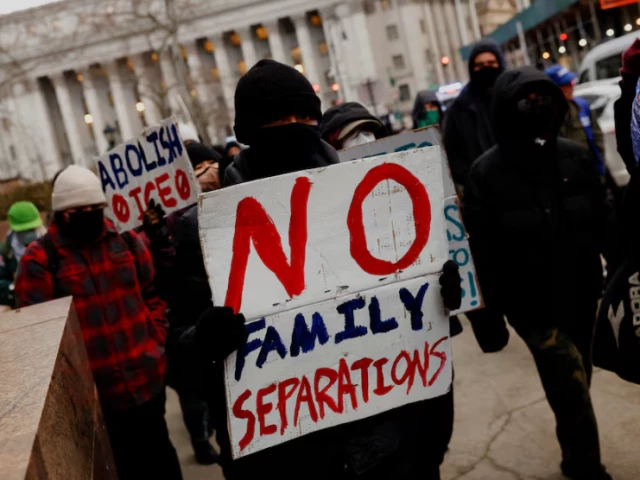US plans daily fines of up to $998 for migrants defying deportation
Trump admin may seize property of immigrants who don't pay fines, per internal emails reviewed by Reuters

The Trump administration plans to fine migrants under deportation orders up to $998 a day if they fail to leave the United States and to seize their property if they do not pay, according to documents reviewed by Reuters.
The fines stem from a 1996 law, that was enforced for the first time in 2018, during President Donald Trump's first term in office. The Trump administration plans to apply the penalties retroactively for up to five years, which could result in fines of more than $1 million, a senior Trump official said, requesting anonymity to discuss non-public plans.
The Trump administration is also considering seizing the property of immigrants who do not pay the fines, according to government emails reviewed by Reuters.
In response to questions from Reuters, US. Department of Homeland Security spokesperson Tricia McLaughlin said in a statement that immigrants in the US. illegally should use a mobile app formerly known as CBP One - rebranded as CBP Home under Trump - to "self deport and leave the country now."
"If they don’t, they will face the consequences," McLaughlin said. "This includes a fine of $998 per day for every day that the illegal alien overstayed their final deportation order."
DHS warned, opens new tab of the fines in a March 31 social media post.
Emails reviewed by Reuters show the White House has pressed US. Customs and Border Protection to handle the issue of penalties, property seizures for migrants who don't pay, and the sale of their assets.
The Department of Justice’s civil asset forfeiture division could be another option for the seizures, one email said.
President Donald Trump kicked off a sweeping immigration crackdown after taking office in January, testing the bounds of US. law to increase arrests and deportations. The planned fines target the roughly 1.4 million migrants who have been ordered removed by an immigration judge.
White house pressure
Trump invoked the 1996 law during his first term to levy fines of hundreds of thousands of dollars against nine migrants seeking sanctuary in churches. The administration withdrew the penalties, but then proceeded with smaller fines of about $60,000 per person against at least four of the migrants, according to court records.
President Joe Biden stopped issuing the fines and rescinded, opens new tab related policies when he took office in 2021.
Scott Shuchart, a top ICE policy official under Biden, said migrants and their supporters could challenge the fines in court but that the threat alone could have a chilling effect.
"Their point isn't really to enforce the law, it's to project fear in communities," he said.
DHS did not immediately respond to a request for comment.
The proposed asset seizures against the migrants who fail to comply with final deportation orders could impact US citizens or permanent residents in their households.
The immigration advocacy group FWD.us estimates that some 10 million migrants with no legal status or temporary protections are living with US citizens or permanent residents in what are known as "mixed status households."
The steep fines could hit lower-income immigrants. An analysis of 2019 Census data by the non-partisan Migration Policy Institute found, opens new tab 26% of households with unauthorized immigrants had incomes below the federal poverty line.
Trump has said people with final deportation orders should be a priority for removal although many have families, jobs and established ties in the US.
The White House National Security Council and Stephen Miller, deputy chief of staff for policy, have been pressing CBP to administer the fines and handle seizures, a CBP official wrote in a March 31 email reviewed by Reuters.
But a CBP memo a day later, also reviewed by Reuters, argued for ICE to take on the task instead. The memo said that CBP's systems do not currently support this type of immigration fine and that upgrading it could lead to significant costs and implementation delays.
The memo anticipated CBP would need at least 1,000 new paralegal specialists, up from the current staffing of 313.
The start date for the fines remained unclear. DHS did not comment on Miller's involvement or the technical aspects of implementing the penalties.























COMMENTS
Comments are moderated and generally will be posted if they are on-topic and not abusive.
For more information, please see our Comments FAQ